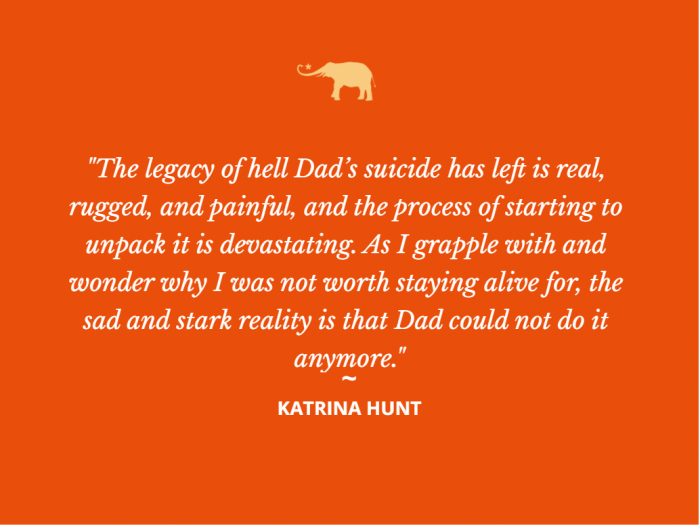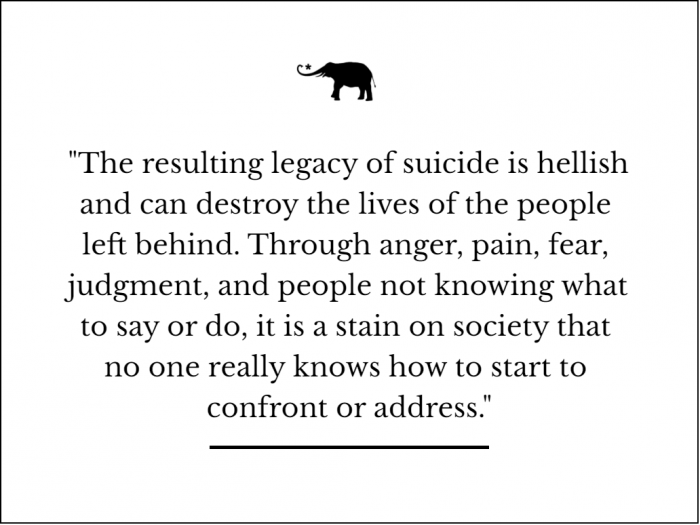~
The pain and legacy of my dad’s suicide, 24 years ago, is horrific.
It is hard to find the words to express the congealed, calcified pain of the wet, dark June night when he died and my life changed forever.
It was a split second. The anguish and pain of that night have been locked away in my psyche for so long that it is hard to fathom how I ever survived, let alone managed to cobble together something that resembles a life.
The last time I saw Dad will be forever etched into my brain. I thought clearly, “I will never see you alive again.” It wasn’t a pleasant, comforting, or nice thought when I was 17 and he was my only living parent.
My eerie thought turned out to be reality three days later on Queen’s Birthday Weekend on one Monday in 1997. I caught the bus back from Tauranga after staying with my grandparents, and he did not come to get me. I had a sinking feeling that he was dead.
The crushing reality of being orphaned, literally overnight, is still numbing. The rage, fury, sadness, disbelief, shock, and horror was essentially frozen in time as I set about trying to survive. There was no space, time, or understanding of what I needed.
The deeply wired resulting anger, rage, and fury in my brain around abandonment and attachment seemed to be formed in a second that night, and yet I am only just starting now to unthaw the process of feeling all of the emotions, which feels a bit like swimming in asphalt at times: heavy, rugged, explosive, with crushing sadness, rage, and a bit of untethered lightness.
So much of me was shut down. My faith and trust in the world were destroyed and a sense of safety was gone. Slowly, bit by bit, it is coming back.
Sometimes, it feels like it is getting worse and that I will never feel happiness, lightness, joy, or pleasure in anything again. The ruggedness and intensity of my buried feelings are potent and super deep. It is just a little bit frightening as it unthaws.
The legacy of hell Dad’s suicide has left is real, rugged, and painful, and the process of starting to unpack it is devastating. As I grapple with and wonder why I was not worth staying alive for, the sad and stark reality is that Dad could not do it anymore. His childhood was appalling with mental illness, abuse, neglect, sickness, and parents who really did not care or show up for him.
While I understand that Dad could do no more, it does not make it any easier or pleasant to process or feel. There is a high degree of “f*ck you” toward my father and the system in my psyche—including a great amount of anger toward the masculine.
The resulting legacy of suicide is hellish and can destroy the lives of the people who are left behind. Through anger, pain, fear, judgment, and people not knowing what to say or do, it is a stain on society that no one really knows how to start to confront or address.
As New Zealand ends another Mental Health Week, maybe it is time to take a different look at suicide—what contributes to it and why people feel that is the only way out. Statistics clearly show that many people think about it at some time in their lives.
The society we have created seems to workshop the “cult” of the individual, and yet people need community and each other now more than ever. The levels of fear, stress, and aggression present in our daily lives are now high and the anger directed at anyone who is not doing what people think is right is huge and generally not related to what it seems to be.
The demons of unprocessed trauma and childhood for many people seem to be coming out to play in not such nice ways. The collective and individual ability to adult or not is showing up at the moment quite clearly.
Our society seems to be trapped in a teenage fantasy that things were always going to be alright and that there is no pain, suffering, or loss. That bubble has been seemingly burst by COVID-19 for many of us without any seeming tools or solutions from the systems that are unable to respond.
It is time for our society to examine and begin to deal with trauma, grief, death, poverty, loss, and racism as wounds of society and an industrial growth culture rather than pathologizing many individuals for being in pain. That is so often a by-product of horrific experiences that remain unhealed on both an individual and collective level, forming part of our current culture.
Dad’s suicide left me with a legacy of pain and hell. Many demons need the light of day and to be held so that they can recede and stop running the sideshow with crazy behaviors.
My healing has been possible because of the relative privilege and safety I have of a stable job and access to money, and that does not happen for many people.
I wonder what becomes of the broken-hearted and think of the so many who have unhappy endings, and think that could have so easily been me.













Read 2 comments and reply